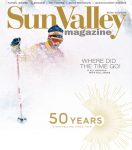The first thing you notice when speaking with Clint Eastwood is his voice. It’s that voice: The voice beneath the hat of Old West gunslinger Will Munny in Unforgiven (1992). It’s the voice of the man who allegedly wore the same poncho, without ever having washed it, as the “Man with No Name” in all three of his Sergio Leone spaghetti Westerns—A Fistful of Dollars (1964), For a Few Dollars More (1965) and The Good, the Bad and the Ugly (1966).
It’s a voice that sounds a bit like a dry and dusty rattlesnake, minus the rattle. But coiled, and waiting to spring. It’s not a voice that you want to mess with. After all, this is a man who spent a good majority of his career making movies about violence—good or bad, heroic or demonic.
But beneath it all, Clint Eastwood also seems like a regular guy. He is at ease in Sun Valley, a place he describes as somewhere he felt he could be himself. “My parents had a place here and, later on, I just starting migrating back. And pretty soon I got to know people up there and I bought a house,” he said. “I liked it because it was never commercial in the sense that it was just a madhouse with people tripping over one another.”
That was before the filming of Pale Rider (1985), which was shot on location just outside of Sun Valley in the Boulder Mountains. “I thought Sun Valley would be the right place,” he recalled. “I knew as much about it as anybody down here [in Hollywood] and I scouted around and found the locations and went ahead with it.”
“When we did Pale Rider, I thought of the fall up there because I had been up there in September and October,” he added, “And I thought what a wonderful time to film because the trees are turning. In fact, I remember we were shooting one time in the town and I looked up; it had been a cold night, and I looked up the next day and all the trees up on the hill were turning. The aspens had all turned gold overnight. And there was snow on the ground. So I said, we’ve got to stop what we are doing and go up there and shoot some shots right now.”
And that’s what they did. Because when Clint Eastwood makes a suggestion, people listen. After all, this is a man who said “Go ahead, make my day.”
And he meant it too. Which is why it works.
So when Clint Eastwood says … he loves Sun Valley because it feels authentic and not commercialized, you know he means it.
I wouldn’t argue with the man.

